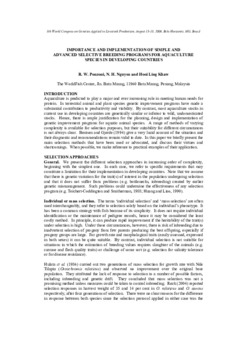Importance and implementation of simple and advance selective breeding programs for aquaculture species in developing countries

Citation
Ponzoni, R.W. (2006). Importance and implementation of simple and advance selective breeding programs for aquaculture species in developing countries. In Proceedings of the 8th World Congress on Genetics Applied to Livestock Production. 13-18 August 2006, Brazil.
Aquaculture is predicted to play a major and ever increasing role in meeting human needs for protein. In terrestrial animal and plant species genetic improvement programs have made a substantial contribution to productivity and viability. By contrast, most aquaculture stocks in current use in developing countries are genetically similar or inferior to wild, undomesticated stocks. Hence, there is ample justification for the planning, design and implementation of genetic improvement programs for aquatic animal species. A range of methods of varying complexity is available for selection purposes, but their suitability for different circumstances is not always clear. Bentsen and Gjerde (1994) give a very lucid account of the situation and their diagnostic and recommendations remain valid to date. In this paper we briefly present the main selection methods that have been used or advocated, and discuss their virtues and shortcomings. When possible, we make reference to practical examples of their application.
Permalink
Date Available
Type
Publisher
Research Themes
Topics
Language